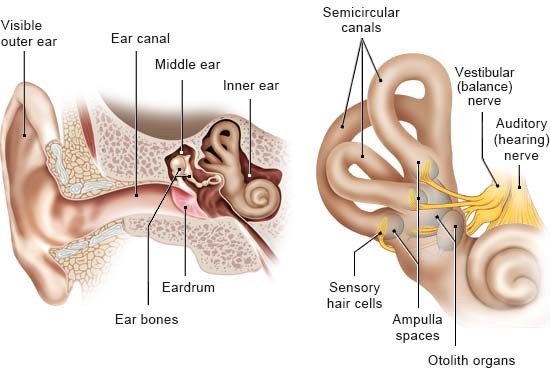The ear is a sensory organ that picks up sound waves, allowing us to hear. It is also very important for our sense of balance: the organ of balance (the vestibular system) is found inside the inner ear.
The vestibular system is made up of three semicircular canals and two otolith organs, which are found diagonally under the semicircular canals. Each of the semicircular canals is filled with fluid and ends in a space called the ampulla. The ampulla spaces and otolith organs have small sensory hair cells in them.
What do the semicircular canals do?
The semicircular canals allow you to "feel" what direction your head is turning in when you move it. If you turn your head to the side, for example, the inner ear turns along with it. But it takes a brief moment for the fluid in the semicircular canals and ampulla spaces to move with our head too. The sensory hair cells in the ear are then bent by the “slow” fluid. They send this information to the brain in the form of nerve signals. When your head stops turning, the fluid bends the sensory hair cells in the other direction. That allows us to notice changes in the speed of the turning movement (accelerating or stopping).
Each of the three semicircular canals detects one of three directions of head movement:
- tilting upwards or downwards,
- tilting to the right or to the left, and
- turning sideways.
What do the otolith organs do?
The otolith organs detect changes in speed of linear movements (in a straight line) – for instance, when you fall, take an elevator, or accelerate or brake in a car. The sensory hair cells in the two otolith organs are embedded in a gel-like membrane that has small crystals (otoliths) in it. When you move, the membrane and sensory hair cells move too, passing this information on to the brain.
Each of the otolith organs tells the brain when the body moves in one of the following types of directions:
- forwards, backwards or to the side (one otolith organ)
- up or down (the other otolith organ)
How does the body use this information?
Information coming from the vestibular system is processed in the brain and then sent on to other organs that need this information, such as the eyes, joints or muscles. This allows us to keep our balance and know what position our body is in.
In some situations (like on a ship or an airplane), different sensory organs might send contradictory messages to the brain. For instance, if you're inside a ship that is tilting to one side, your vestibular system will tell your brain that your body is tilting to the side. But your eyes might tell your brain that you're not tilting because they can only see the inside of the ship, which appears to be "straight." This can cause us to feel unwell, dizzy or nauseous.
The vestibular system is especially sensitive in children, and reacts more slowly to movements as we grow older. Inner ear infections and other problems may also affect how well our sense of balance works.
Brandes R, Lang F, Schmidt R. Physiologie des Menschen: mit Pathophysiologie. Berlin: Springer; 2019.
Lenarz T, Boenninghaus HG. Hals-Nasen-Ohren-Heilkunde. Berlin: Springer; 2012.
Menche N. Biologie Anatomie Physiologie. München: Urban und Fischer; 2023.
Pschyrembel Online. 2025.
IQWiG health information is written with the aim of helping people understand the advantages and disadvantages of the main treatment options and health care services.
Because IQWiG is a German institute, some of the information provided here is specific to the German health care system. The suitability of any of the described options in an individual case can be determined by talking to a doctor. informedhealth.org can provide support for talks with doctors and other medical professionals, but cannot replace them. We do not offer individual consultations.
Our information is based on the results of good-quality studies. It is written by a team of health care professionals, scientists and editors, and reviewed by external experts. You can find a detailed description of how our health information is produced and updated in our methods.
Stay informed
Subscribe to our newsletter or newsfeed. You can find our growing collection of films on YouTube.

